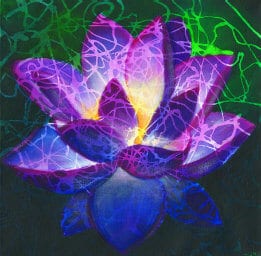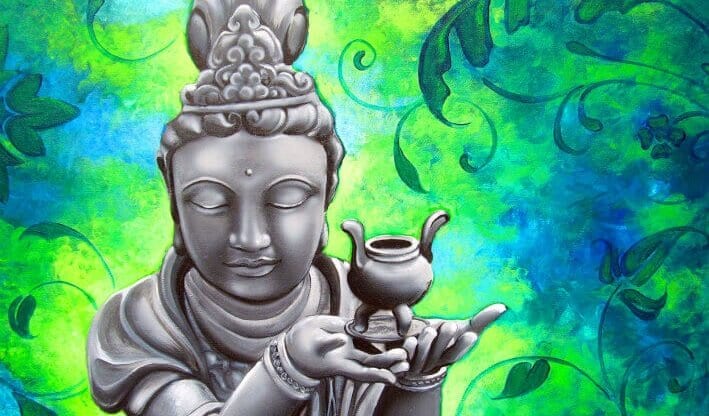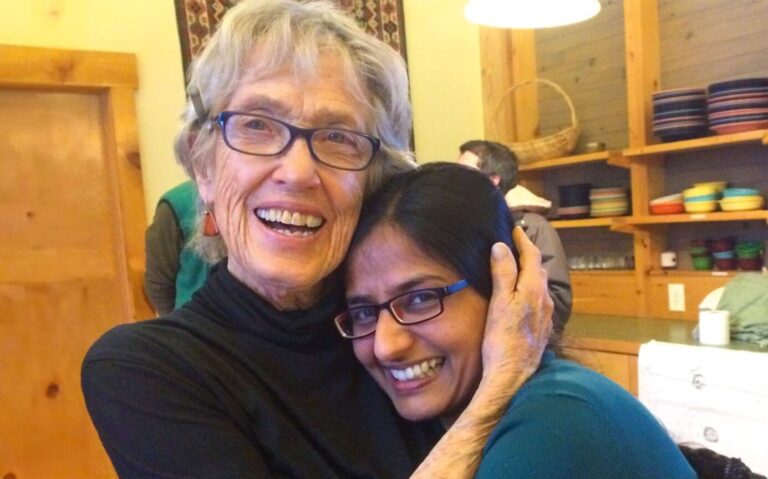NAB: How can we reclaim and mobilize feminine energy to transform ourselves, and the world?
Thanissara: That is another good question; one that I am still pondering! To tell you the truth; I’m not altogether sure. This is because we are so deeply immersed in patriarchal conditioning it’s hard to recognize there are other ways of being and living. Probably a good place to start is to explore cultures that still remember and honor the primal Mother, the living Earth, and who have direct knowledge of the web of life. For that we need to, very humbly, look toward those First Nation Peoples who have managed to maintain their spiritual and cultural integrity. They should be invited to advise and lead at this moment, while at the same time, our Euro-centric world should express profound regret at their decimation, and seek to make amends.
We can also pray. That means we need to recognize our lost-ness, acknowledge our pain, and ask for guidance from the forces of wisdom and compassion. Then, we need to listen into the living silence. We should do this together, through ceremony, and carefully held spaces where we can share, and talk authentically.
We can also resist the force of violence that inverts and undermines a more caring relationship to our self, our body, and so on. We should protest against the abuses and destruction of other beings, the animals, forests, the oceans, and the great expanse of Mother Nature. We should join forces with others to protect the Earth at this time. We should also move toward a plant-based diet, as the extreme cruelty of factory farms is a travesty and affront to Mother Earth. The animals are her children, and not ours to exploit.
NAB: How does the sacred feminine transcend the boundaries of gender and religion?
Thanissara: All distinctions are transcended in our own minds and hearts. Once we understand the spirit, we see it within all forms. The term “sacred feminine” has a bias. We only use this term because we are out of balance due to nearly 4,000 years of patriarchal conditioning. Ultimately the feminine is formless; she is the womb out of which all creation emerges. We are fixated on the forms and have forgotten the life giving energy, or consciousness, that inhabits forms. Ultimately “masculine” and “feminine” are false designations, as you cannot find one without the other, and as we see nowadays, gender is very mutable. The same with religions, they do not own the spiritual realm. They are only the peel of the fruit, but they are not the fruit. The true fruit, that nourishes, is conscious awareness at the core of every being, every circumstance, every moment, and every breath. This belongs to no one, and is neither male nor female.
For the most part, we weren’t brought up being asked, “What do you feel?” We were asked, “What do you think?” or “What’s your opinion, or position?”
NAB: Can you talk a little bit about the wounded masculine? What do you envision a path to healing looks like? How do we better integrate ourselves, and our actions?
Thanissara: Well, I don’t live within a male experience, so I don’t want to make any presumptions. On the other hand, whether male or female, we all carry something of the wounded masculine due to historic patriarchal conditioning. For example preference is given an abstracted, rational interpretation of ourselves, and the world. For the most part, we weren’t brought up being asked, “What do you feel?” We were asked, “What do you think?” or “What’s your opinion, or position?” Men risk social death if they display vulnerability, or express feelings and emotions that are considered weak, (fear, grief, even love.) This is a violence that is instilled into boys at a very young age.
A lot of pressure is put on men to perform, to be clear, to have a strategy and direction. This pressure is internalized as an unforgiving, judgmental, tyrant that disapproves, condemns, and always says, “you should do better.” Men are not allowed to soften, or be receptive and open to their own insecurities, and their own feelings. Often men, conditioned to be self-reliant and never ask for help, rely on women to negotiate the relational world for them, which can leave them vulnerable to loneliness and isolation.
Healing the Masculine, Reclaiming the Feminine
Healing the masculine involves entering the feminine through an initiatory process that opens into feeling, intuition, and the relational field. To do this, men need to allow themselves to be vulnerable, which happens for all of us when, say, we fall in love. A more conscious way of doing this is to enter into some kind of therapeutic relationship that invites authentic softening, so the layers beneath the defenses can be seen, met, and healed. It’s easier for men to open to the feminine once they understand it’s an archetypal energy, and not their mothers! Many men, wounded by overly controlling, cold and abusive, or emotionally incestuous mothering, deeply fear making themselves vulnerable. However, somehow, they have to find a way to do exactly that. The masculine archetype of protector also needs to redefined, so respectful relational skills, like diplomacy and negotiation, are applauded, and the coarse masculine archetypes of brute force, assumed authority, and domination are relegated to the trash heap of history.
On the other hand, reclamation of the feminine tends to involve women learning to empower themselves. For example, learning to say “no.” Women often feel overly responsible for securing everyone’s needs, responding to all requests, and placating everyone’s discomfort, usually at great expense to themselves. For women, or men, who have this tendency, saying, “I’m sorry, I can’t do that”, or “I need to look after myself” can be very difficult, but it is necessary.
It’s up to all of us to do what we can to safeguard the future…. We also have to understand that there is no “safe” place where we can sit out our collapsing world.
Women also need to trust their ability to receive holographic information, which often gives them a fuller picture of what is emerging. This includes trusting their intuitive sense of appropriate response. Ultimately, regardless of gender, we need to balance both the healthy masculine and feminine within our own psyches, so we can birth and parent a sustainable, humane, and ethical world.
NAB: Let’s talk intersectionality: how do you see feminism changing in the 21st century, in terms of working for people of all races and gender identities? How far do we still have to go, and how do you think each individual can work to get there? (If you’d like to, could you address both inward reflection and outward action in that last bit?)

Thanissara: Another good question! I tend not to project into the future, as it’s so uncertain. But it’s important to acknowledge that there are extremely malignant powers at play these days, which threaten everything we hold dear. We’re in the midst of an almighty battle that is playing out on so many levels. What is at stake is the ability to secure a feasible future. We should not underestimate the deep psychotic patriarchal dinosaur that in its belligerence and hatred would rather see a burnt and tortured earth, than give up its quest for domination. In the face of that, we can’t take the hard won rights and liberties of the last century for granted.
It’s up to all of us to do what we can to safeguard the future. This also means acknowledging the plight of those reeling from the impact of a warming biosphere, due, in great part, to the high level of resources we use in our entitled lives. We also have to understand that there is no “safe” place where we can sit out our collapsing world. So we must recognize our common ground, and work together to change what we can. Many from marginalized communities already know how difficult it is to go up against power, so we have much to learn from their struggle.
Feminism is now an issue for everyone. It’s not necessary to have a female gender to understand that. The inclusion of feminine attributes, for example empathy, mutuality, nurturing, and receptivity, alongside cooperative consensus building, is the bedrock of our new, emerging world. The relationally collaborative energy of the feminine, however, doesn’t necessarily translate into women supporting each other. An aspect of patriarchal wounding is that women are conditioned to support men, and not always each other. So this is something to be aware of as we work to reclaim the sacred feminine in everyday relationships, regardless of gender.
The hierarchies of patriarchal power move in linear, vertical lines, where competitive energies forever undermine deeper trust, alignment, joy and mutual success. Instead, the healthy feminine moves into circles, shares, and hears into the collective process, and from that, discerns the wisdom from the communal field so it can inform action for the welfare of the whole, not just a few.
As we learn to listen into our own being, through meditative, therapeutic, and body aware processes, then we’ll better be able to heal and uplift the collective. The new world is emerging, not only from outer changes, but also from a deep evolutionary shift of consciousness. While we see the forerunner of this understanding in the work of quantum physics, for example, it is actually old wisdom. This wisdom is articulated well by Zen master Dogenji, when he said, Enlightenment is the intimacy of all things. It is this realization that we are being initiated into, and it is this truth that will save our world.
Feminism is now an issue for everyone. It’s not necessary to have a female gender to understand that. The inclusion of feminine attributes, for example empathy, mutuality, nurturing, and receptivity, alongside cooperative consensus building, is the bedrock of our new, emerging world.
NAB: What role does the sacred feminine play in addressing our time of environmental crisis?
Thanissara: Well firstly, investing in women is one of the best ways to generate a positive force for change. Many studies show that when women are empowered financially, it increases the well being of their families and communities. Offering educational opportunities and scholarships to girls also gives them a better opportunity to influence society. Educating women around political power and voting rights is also essential, as women, who are conduits for the sacred feminine, are desperately needed on the political stage, and in the halls of power.
Ensuring a Sustainable Earth for Future Generations
To ensure a sustainable Earth for future generations, there has to be some way of moderating population. The best way to do this is to educate girls, and boys, around reproductive processes, and parental responsibilities. In particular, it’s important to empower women by allowing them full access to birth control methods, and power over reproductive choices. It is a travesty that this basic right is still unavailable to millions of women due to patriarchal religious views, or misogynistic government policies.
On a more personal level, we as women, have to learn to access the power of the sacred feminine and use it well. Sometimes, because of generational repression and abuse, our ways of using power can be manipulative. Deeply held anger, which is socially unacceptable for women to express, makes us resentful or passive-aggressive, or we collapse into depression and helplessness. All of these symptoms can be worked through once we understand that the core issue is reclamation of power, truth, and an authentic voice.
Overall, the success in overcoming our environmental crisis will depend, not just on new technologies and systems, but a radical change of consciousness. The new consciousness is one infused with the sacred feminine, which is as old as the earth, immanent within all life, and intimate within all beings. I believe, when we tune into her mysterious promptings, we will find our part to play, personally and collectively, in overcoming this unprecedented global crisis.
What a great honor for us to be alive at this time, and be an instrument of the grace and power of both the sacred feminine and divine masculine. Let us not waste this occasion; let us use this opportunity wisely.
How are the dharma, the sacred feminine and earth-caring action related? In Part 1 of this interview, Thanissara explores how in Buddhist practice we can reclaim the sacred feminine—which is not defined by gender—as one means of connection open to us in our efforts to affect climate change.








